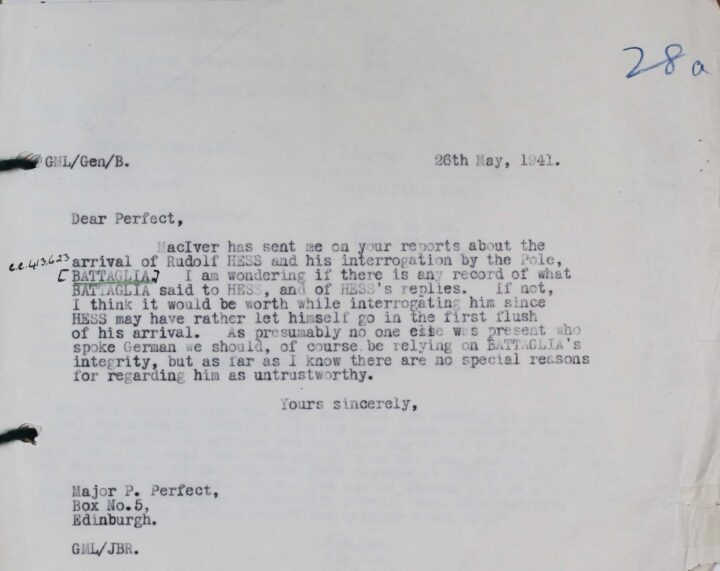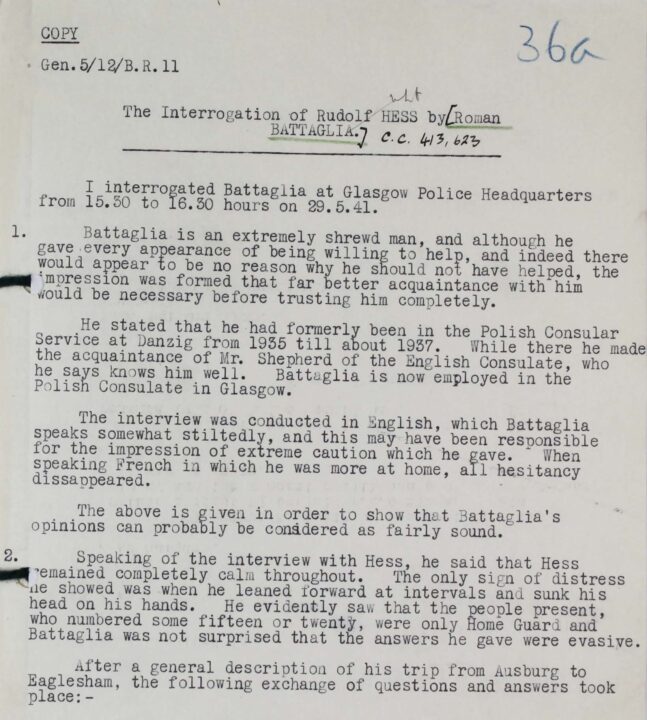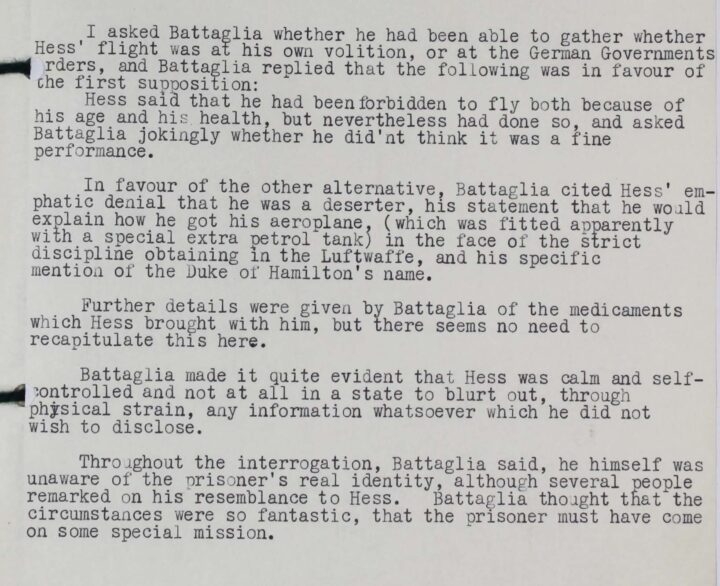KV series: Files on Rudolf Hess, 1941, Catalogue ref: KV 2/35.
We hope you enjoyed watching our Education Service video with International and Military Records Specialist, Elizabeth Haines looking at records from the Secret Services. This video focuses on letters and reports from the personal file of Rudolf Hess.
Now try and answer the following questions:
- Which records are held in the KV collection at The National Archives?
- Why does The National Archives have these files?
- What is the difference between the two security services, M.I.5 and M.I.6?
- What information is held in the personal files called KV2?
- Can you name two people for example, who have personal files created by the security services?
- Why were these files created?
- Search The National Archives catalogue, Discovery, for KV 2/35. Who personal file is this? Can you see any other personal files?
- Who was Rudolf Hess?
- According to the video, what information is contained in Hess’s file?
- Does this personal file explain the reason for his flight to Britain in 1941 during the Second Word War?
- What does the file infer about the role of the security service, M.I.5?
- Why is it important to consult other sources when researching this topic?
- Why might some material in security service records remain closed to the public?
Document 1
Security service letter to Major Perfect, Scottish Regional Office Security Officer, dated 26 May 1941. Catalogue ref: KV 2/35
Tasks
- Why do the security services want more information about the interrogation of Rudolf Hess by [Roman] Battaglia?
- Why do these services also want to interview Battaglia?
- What appears to be their opinion of Battaglia?
Transcript
GML/Gen/B. 26th May, 1941
Dear Perfect,
MacIver has sent me on the reports about the arrival of Rudolf HESS and his interrogation by the Pole, [BATTAGLIA]. I am wondering if there is any record of what BATTAGLIA said to HESS and HESS’S replies. If not, I think it would be worthwhile interrogating him since HESS may have rather let himself go in the first flush of his arrival. As presumably no one else was present who spoke German, we should of course be relying on Battaglia’s integrity, but as far as I know there are no special reasons for regarding him as untrustworthy.
Yours sincerely,
Major P. Perfect,
Box No. 5,
Edinburgh.
GML/JBR.
Document 2
Extract from a copy of a report called ‘The interrogation of Rudolf Hess by Roman Battaglia’, 1941. Catalogue ref: KV 2/35
The report was created for the Director of Counter Espionage, Guy Liddell.
[Please note this image is a slightly cropped version of original, reflected in the transcript.]
Tasks
- What appears to be the view and attitude of the security services towards Battaglia?
- Is this same view shared in Document 1?
- Can you explain why the language in which the interview was conducted could have influenced the impression given by Battaglia?
- What appeared to be Battaglia’s views on Rudolf Hess when he interviewed him?
- What other sources could you use to find out more about these events? Explain why this would be valuable.
Transcript
COPY
Gen.5/12/B.R.11
The Interrogation of Rudolf Hess by [Roman BATTAGLIA]
I interrogated Battaglia at Glasgow Police Headquarters from 15.30 to 16.30 hours on 29.5.41.
- Battaglia is an extremely shred man, and although he gave every appearance of being willing to help, and indeed there would appear to be no reason why he should not have helped, the impression was formed that far better acquaintance with him would be necessary before trusting him completely.
He stated that he had formerly been in the Polish Consular Service at Danzig from 1935 till about 1937. While there he made the acquaintance of Mr. Shepherd of the English Consulate, who he says knows him well. Battaglia is now employed in the Polish Consulate in Glasgow.
The interview was conducted in English, which Battaglia speaks somewhat stiltedly, and this may have been responsible for the impression of extreme caution which he gave. When speaking French in which he was more at home, all hesitancy disappeared.
The above is given in order to show that Battaglia’s opinions can probably be fairly sound.
- Speaking of the interview with Hess, he said that Hess remained completely calm throughout. The only sign of distress he showed was when he leaned forward at intervals and sunk his head on his hands. He evidently saw that the people present, who numbered some fifteen or twenty, were only Home Guard and Battaglia was not surprised that the answers he gave were evasive.
After a general description of his trip from Ausburg [Germany] to Eaglesham [Scotland], the following exchange of questions and answers took place:-
…
Document 3
Extract from a copy of a report called ‘The interrogation of Rudolf Hess by Roman Battaglia’, 1941. Catalogue ref: KV 2/35
The report was created for the Director of Counter Espionage, Guy Liddell.
[Please note this image is a slightly cropped version of original and reflected in transcript.]
Tasks
- What does the extract reveal about the view of the security services in explaining Hess’s flight to Britain?
- How did Battaglia explain Hess’s flight to Britain according to this extract?
- What seems to be Battaglia’s opinion of Hess?
- What do both extracts (2 and 3) reveal about the view and attitude of the security services towards Battaglia?
- What other sources could you use to find out more about these events? Explain why this would be valuable.
Transcript
I asked Battaglia whether he had been able to gather whether Hess’s flight was of his own volition, or at the German Government’s orders, and Battaglia replied that the following was in favour of the first supposition.
Hess said that he had been forbidden to fly both because of his age and his health, but nevertheless had done so, and asked Battaglia jokingly whether he didn’t think it was a fine performance.
In favour of the other alternative, Battaglia cited Hess’s emphatic denial that he was a deserter, his statement that he would explain how he got his aeroplane, (which was fitted apparently with a special extra petrol tank) in face of the strict discipline obtaining in the Luftwaffe, and his specific mention of the Duke of Hamilton’s name.
Further details were given by Battaglia of the medicaments which Hess brought with him but there seems no need to recapitulate this here.
Battaglia made it quite evident that Hess was calm and self-controlled and not at all in a state to blurt out, through physical strain, any information whatsoever which he did not wish to disclose.
Throughout the interrogation, Battalia said, he himself was unaware of the prisoner’s real identity, although several people remarked on his resemblance to Hess. Battaglia thought that the circumstances were so fantastic, that the prisoner must have come on some special mission
….
Connections to curriculum
Key stage 3
Challenges for Britain, Europe, and the wider world 1901 to the present day.
Key stage 4
AQA GCSE History: Germany, 1890–1945: Democracy and dictatorship.
OCR GCSE History Germany 1925–1955: The People and the State.
Key stage 5
AQA GCE. Democracy and Nazism: Germany, 1918–1945.
Edexcel GCE Germany, 1871–1990: united, divided and reunited.
OCR GCE: International Relations 1890–1941.
External links
BBC articles on Rudolf Hess.
Rudolf Hess was the last state prisoner to be held at the Tower of London.
United States Holocaust Memorial Museum: Rudolf Hess
Article from The Smithsonian Magazine exploring possible reasons for Hess’s flight.
Related resources
- Adolf Hitler
- Was Hitler a ‘passionate lunatic’?
- World War II
- Take a fresh look at the biggest conflict in history.




